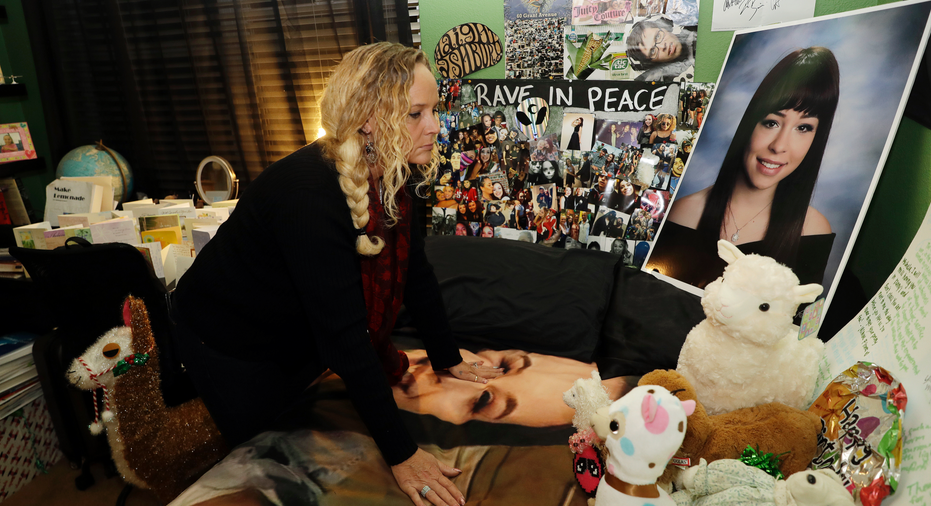Warehouse fire anniversary focuses attention on city efforts

SAN FRANCISCO – The deadliest U.S. building fire in more than a decade has left David Gregory with a recurring nightmare that still wakes him up in tears.
Gregory's 20-year-old daughter, Michela, was among 36 people who died in the Dec. 2, 2016, blaze at an Oakland warehouse, and in the dream Gregory can hear her calling his name and screaming for help.
"And there's nothing I can do," he said during a recent telephone interview, his voice quivering with emotion. "I always wake up crying, and it happens a lot."
The one-year anniversary of the fire at the building known as the Ghost Ship is bringing back painful memories for Gregory and other victims' families.
"You never recover from it," said Mary Alexander, an attorney who is representing Gregory and other victims' families in a lawsuit that names the city, the warehouse's owner and its operator. "All of them are anxious about the one-year. It's creating a lot of emotions."
The anniversary is also refocusing attention on Oakland, a beleaguered San Francisco Bay Area city that was excoriated following the blaze for a series of failures that allowed the warehouse to function illegally as a cluttered living space for artists with no fire alarms or sprinklers. The fire occurred during an unpermitted electronic music concert.
Oakland Mayor Libby Schaaf in January vowed never to forget the victims.
"We will learn all we can from this horrific tragedy to make Oakland a safer and more resilient community," she said in an executive order directing city officials to prioritize building inspections, audit the fire department's inspection bureau and create a database to share information about problem buildings across city departments.
A city report in November touted Oakland as safer since the blaze, but some officials have a more mixed assessment of the city's efforts, criticizing them as slow and incomplete.
Just months after the Ghost Ship blaze, a fire at a dilapidated building killed four people, reinforcing criticism that Oakland was inept after emails showed a fire captain recommended shutting the place down weeks earlier and another fire official warned it was dangerous.
The city is more than doubling its number of fire code inspectors, but the full contingent of 20 inspectors won't be in place until the end of 2018. The database to share information about problem buildings also won't be up and running until next year.
The system is considered vital after the Ghost Ship fire exposed communications breakdowns between officials. Records show in the months before the blaze, city officials received numerous complaints about the warehouse and police repeatedly visited the site. Inspectors had knocked on the Ghost Ship's doors a few times, but none had stepped inside the warehouse for at least 30 years.
Dan Robertson, head of the union that represents city firefighters, said the city is moving in the right direction.
"But we'd like to see change come a little bit faster and perhaps with more dedication of resources coming directly to the fire department, he said.
Rebecca Kaplan, an Oakland councilwoman, said she was "very concerned about the number of things that haven't been done yet."
City spokeswoman Karen Boyd did not comply with a request for interviews with city officials.
Since the Ghost Ship fire, the city has investigated 32 warehouses or commercial spaces that were suspected of serving illegally as housing, work or gathering spots and scores of other properties with multiple hazards identified by firefighters, according to its November report.
The city also got a new fire chief in October.
The Ghost Ship fire highlighted the precarious living situations of artists seeking affordable housing amid skyrocketing rents in the Bay Area.
In its wake, Los Angeles, Baltimore and other cities cracked down on commercial spaces that were used illegally as housing or performance venues.
Schaaf said in her January executive order that Oakland wanted to avoid displacing "vulnerable community members" while improving safety — a balance that can be tricky to achieve.
The city is working with the owners of 16 of the 32 commercial properties to address residential violations, but acknowledged many owners have evicted tenants instead of trying to bring their properties up to code.
Prosecutors, separately, have charged two men, Derick Almena and Max Harris, with involuntary manslaughter in the blaze. Almena rented the warehouse and lived there with his family. Harris also lived in the building and helped Almena book musical acts and sublet the space to artists looking for affordable housing.
Prosecutors say the men knowingly created a firetrap and deceived the building's owner, police and fire officials about the fact that people were living there. The two have pleaded not guilty and say they are being scapegoated.
In their lawsuit, the victims' families say the city knew the Ghost Ship was a major fire risk but took no action to protect its occupants. Police body camera footage obtained by the East Bay Times shows officers visited the warehouse site multiple times in 2015, once talking to Almena and threatening to shut it down.
A judge in a Nov. 8 ruling indicated he was not inclined to allow the city to avoid the suit, saying there was "no question of the authority and obligation of the city to act when faced with an unsafe and substandard building."
Gregory, 49, said he hopes the city "will do what's right." He recalled going through denial in the hours after the fire, as he tried to contact his daughter but didn't want to believe she was at the party.
"I know it happened," he said. "It's been 12 months. She's not coming home. But it hasn't gotten any easier."



















